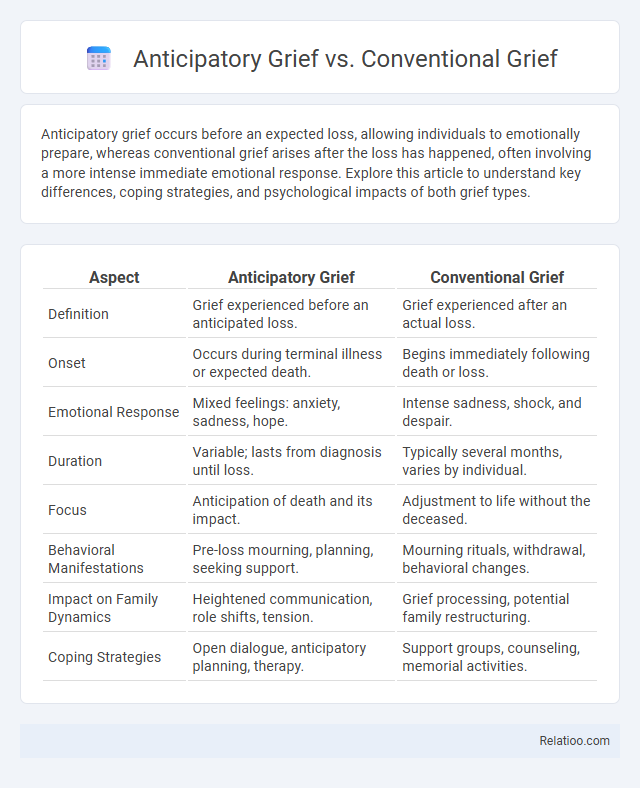Anticipatory grief occurs before an expected loss, allowing individuals to emotionally prepare, whereas conventional grief arises after the loss has happened, often involving a more intense immediate emotional response. Explore this article to understand key differences, coping strategies, and psychological impacts of both grief types.
Table of Comparison
| Aspect | Anticipatory Grief | Conventional Grief |
|---|---|---|
| Definition | Grief experienced before an anticipated loss. | Grief experienced after an actual loss. |
| Onset | Occurs during terminal illness or expected death. | Begins immediately following death or loss. |
| Emotional Response | Mixed feelings: anxiety, sadness, hope. | Intense sadness, shock, and despair. |
| Duration | Variable; lasts from diagnosis until loss. | Typically several months, varies by individual. |
| Focus | Anticipation of death and its impact. | Adjustment to life without the deceased. |
| Behavioral Manifestations | Pre-loss mourning, planning, seeking support. | Mourning rituals, withdrawal, behavioral changes. |
| Impact on Family Dynamics | Heightened communication, role shifts, tension. | Grief processing, potential family restructuring. |
| Coping Strategies | Open dialogue, anticipatory planning, therapy. | Support groups, counseling, memorial activities. |
Understanding Anticipatory Grief
Anticipatory grief occurs before an impending loss, allowing you to process emotions while the loved one is still present, unlike conventional grief which happens after a loss. This form of grief helps in preparing emotionally for the change and can influence how you cope during and after mourning. Understanding anticipatory grief is essential to recognize its unique emotional stages and seek appropriate support before the actual bereavement.
Defining Conventional Grief
Conventional grief is the natural emotional response experienced after the loss of a loved one, characterized by feelings of sadness, longing, and sometimes anger or guilt. Unlike anticipatory grief, which occurs before a loss, conventional grief unfolds after the death, with mourning representing the external expressions and rituals that guide you through the healing process. Understanding these distinctions helps you navigate your emotional journey more effectively.
Key Differences Between Anticipatory and Conventional Grief
Anticipatory grief occurs before an impending loss, allowing You to emotionally prepare for the death or major change, whereas conventional grief happens after the loss has occurred. Key differences include the timing, emotional intensity, and coping mechanisms; anticipatory grief may involve a prolonged period of adjustment and mixed emotions, while conventional grief often features a more acute and immediate response. Mourning is the outward expression of grief, encompassing rituals and behaviors that vary culturally, distinct from the internal experience of both anticipatory and conventional grief.
Common Triggers for Anticipatory Grief
Common triggers for anticipatory grief include receiving a terminal diagnosis, witnessing a loved one's rapid health decline, and facing the impending loss of a significant relationship. Unlike conventional grief, which occurs after a death, anticipatory grief begins before the loss happens, allowing Your emotions to evolve as you mentally prepare for the future. Mourning typically involves the outward expression of grief following death, while anticipatory grief involves complex feelings such as anxiety, sadness, and hope during the pre-loss phase.
Stages of Conventional Grief
Conventional grief typically progresses through distinct stages including denial, anger, bargaining, depression, and acceptance, as outlined in the Kubler-Ross model. Each stage represents emotional responses that individuals may experience sequentially or cyclically while processing loss. Unlike anticipatory grief, which occurs before an impending death, conventional grief unfolds after the loss, whereas mourning involves outward expressions and rituals to honor the deceased.
Emotional Responses in Anticipatory Grief
Anticipatory grief often involves intense emotional responses such as anxiety, sadness, anger, and helplessness while the loss is still impending, distinguishing it from conventional grief and mourning that occur post-loss. This form of grief allows individuals to begin processing emotions ahead of time, which can include fluctuating hope and despair related to the anticipated death or significant change. Emotional responses in anticipatory grief may also encompass guilt or relief, reflecting a complex psychological preparation for the upcoming reality.
Coping Strategies for Each Type of Grief
Anticipatory grief involves coping strategies such as seeking social support, engaging in counseling, and practicing mindfulness to address emotions before a loss occurs. Conventional grief requires acceptance through rituals, expressing emotions openly, and accessing grief support groups to facilitate healing. Mourning focuses on honoring the deceased with culturally meaningful ceremonies, maintaining connections through memorialization, and gradually rebuilding daily routines to foster adjustment.
Impact on Relationships and Family Dynamics
Anticipatory grief, experienced before an impending loss, can create complex emotional tensions within your family, sometimes fostering closer bonds or causing conflicts as members cope differently. Conventional grief arises after the loss, often eliciting shared expressions of sorrow that can either strengthen family connections or highlight existing fractures. Mourning, the ritualized process of expressing grief, provides structured opportunities for families to communicate and support one another, influencing the long-term dynamics and healing within relationships.
Professional Support and Resources
Professional support for anticipatory grief often involves counseling that prepares You for an expected loss, focusing on coping strategies before the event occurs. Conventional grief support typically includes therapy and support groups that help individuals process emotions after a loss, emphasizing emotional expression and adjustment. Mourning resources may involve community rituals and cultural practices guided by professionals to facilitate healing and social support during the grieving process.
Choosing the Right Path to Healing
Anticipatory grief arises before a loss occurs, allowing you to process emotions gradually, while conventional grief happens after the event, often with more intense initial pain. Mourning involves the external expressions and rituals that help navigate and make sense of this pain. Choosing the right path to healing depends on recognizing these differences and embracing the approach that aligns with your emotional needs and circumstances.

Infographic: Anticipatory Grief vs Conventional Grief
 relatioo.com
relatioo.com